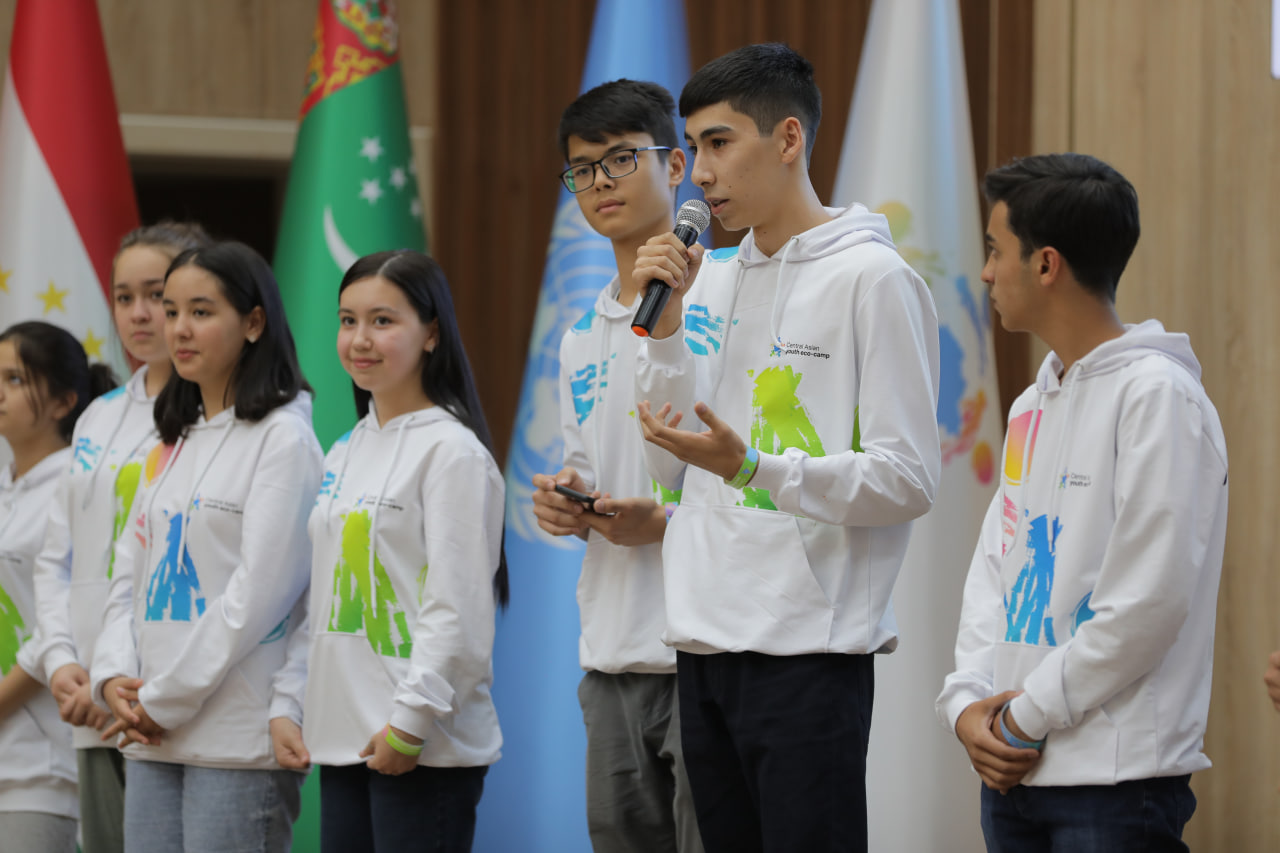
On 1 October 2023, a Central Asian youth environmental camp kicked off in Samarkand, Uzbekistan, aimed at developing a Central Asian strategy to promote a culture of sustainable development and involve children and youth in the climate agenda, the Ministry of Ecology, Environmental Protection and Climate Change of Uzbekistan said in a press release.
The Central Asian eco-camp, which brought together more than 60 youth leaders eco-activists from Uzbekistan, Kazakhstan, Kyrgyzstan, Tajikistan and Turkmenistan, is held on the eve of COP-28 – the Conference of the Parties to the Convention on Climate Change, which will be held from 30 November to 12 December 2023 in the United Arab Emirates (UAE).
“We are here to listen to young people and your opinion on climate change issues. As you know, nature knows no boundaries, and a regional approach, dialogue between parties, and youth involvement in solving these problems are key. Everyone has the right to be heard. The Central Asian Youth Eco Camp is one of the events that will allow you to speak out,” said Aziz Abdukhakimov, Minister of Ecology, Environmental Protection and Climate Change of the Republic of Uzbekistan.
“The agenda is important because we want to emphasize the decisive voices in this process. Overall, when we talk about climate change, without your contribution, your participation, and the opportunity for each of you to speak out in this process, we probably will never achieve serious results,” noted Munir Mamedzade, Head of the UNICEF Office in Uzbekistan, at the opening of the event.
The main goal of the Central Asian eco-camp is to recognize the role of youth in actions to combat climate change, to provide a platform for young eco-activists to put forward proposals and eco-initiatives, as well as the integration of the youth environmental movement in Central Asia.
Within five days, events such as lectures on “Climate in Central Asia from UNICEF”, “Regional Issues and Measures for Mitigation and Adaptation to Climate Change from UNDP”, “Declaration on Children from UNICEF”, “GEP Initiative from UNESCO”, “Practical Case Studies of Regional Projects”, “Introductory Lecture on Regional Strategy from the Ministry of Ecology and Ministry of Education”, work in groups on the CA roadmap, chess tournament of the International University of Tourism and Cultural Heritage “Silk Road”, discussion and presentation of teamwork results, Eco-Zakovat game, presentation of the Eco-Schools project “Eco Education in Uzbekistan”, presentations of eco-educational programs in Central Asia by representatives of foreign delegations, presentations of the “Silk Road” University on the CA Roadmap and “Sustainable Practices and Traditions of Central Asian Peoples”, tree planting on the territory of the University, and more are organized for eco-camp participants.
The eco-camp participants will enjoy excursions to the Silk Road Samarkand tourist complex, the Konigil tourist village, and historical sights of Samarkand.
“The important thing is that the initiative for the Central Asian eco-camp comes from young people. Young eco-activists become drivers of ideas and thus influence us, adults. They give us a message to take into account their voices in our work. And this will happen here, in the eco-camp, where young people, scientists, and representatives of international organizations will work together,” said the First Deputy head of the executive body of the International Public Fund Zamin, Abdukakhhor Abduganiev.
The Central Asian eco-camp is organized with the support of the Ministry of Ecology, Environmental Protection, and Climate Change, the Ministry of Preschool and School Education, the Ministry of Youth Policy and Sports, the International Public Fund “Zamin”, UNICEF, UNESCO, UNDP, and FAO.
During the event, experts from UNICEF, UNDP, FAO, and UNESCO focused on climate change in Central Asia and examined the issues of global warming, its causes, and consequences. Youth representatives together with international experts also discussed the impact of climate on the regional economy and social sphere.
“Today’s eco-camp is not only a good opportunity to discuss important topics but also a real example of how youth can become active participants in the fight to save our planet,” shared young eco-activist Rahima Noken from Kazakhstan.
“One of the most interesting ideas that I liked in the discussions is the “Implementation of volunteer hours when getting a job or entering university,” added Rahima.
Eco-camp will complete its work on 5 October. ///nCa, 4 October 2023 (photo credit – Ministry of ecology, environment protection and climate change of Uzbekistan)
#Uzbekistan, #Tajikistan, #Turkmenistan, #Kazakhstan, #Kyrgyzstan, #Eco-camp, #youth, #CentralAsia